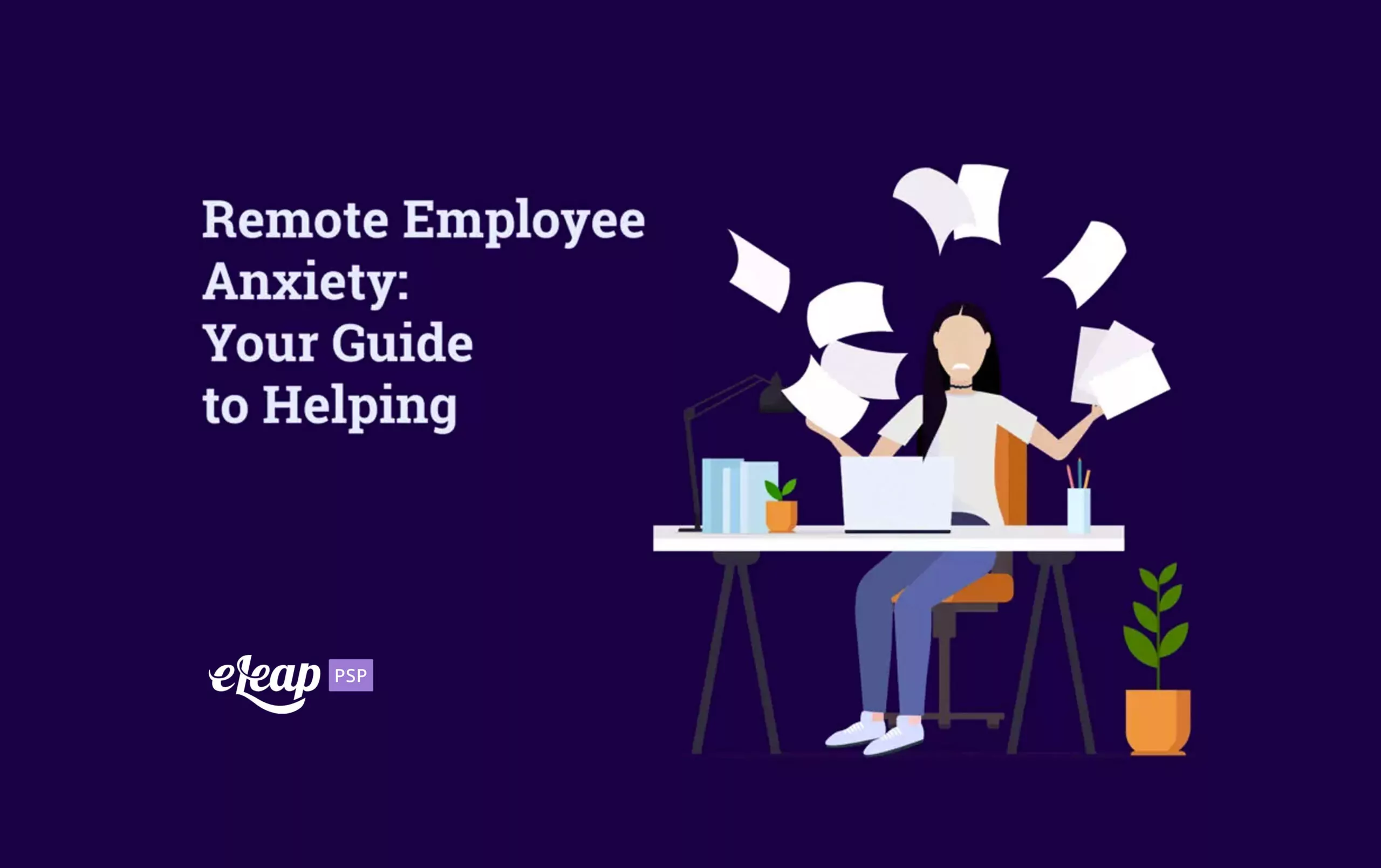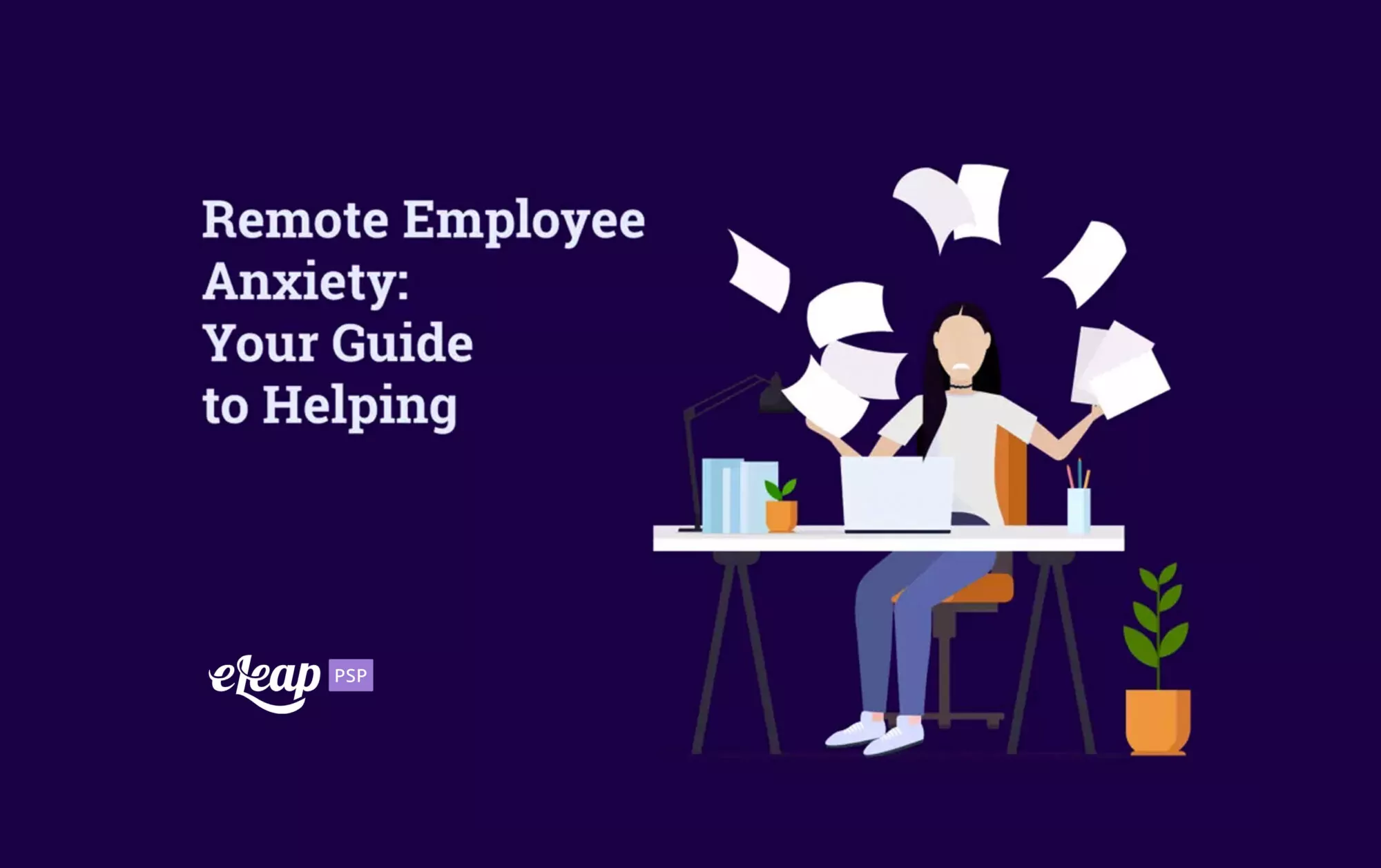Remote Employee Anxiety: Your Guide to Helping

Our new normal was kind of exciting at first. It allowed everyone to see what working from home was really like. However, for many people, that situation quickly changed.
The excitement of working from a home office gave way to feelings of worry and stress. Anxiety grew in many workers’ minds and hearts. The good news is that there are things you can do as a manager to help reduce that anxiety, improve working conditions, and boost employee morale. We’ll dive into what you should know below.

Why Is Anxiety Present?
Before we touch on how to help reduce remote worker anxiety, let’s talk a bit about why your remote workers are feeling anxious in the first place. Shouldn’t things be on a more even keel? After all, they’re working from home, so they no longer have to worry about that daily commute, dealing with the physical workplace, and other issues. There are many reasons for anxiety, including the following:
- Forced to Work Remotely – Your employees are being forced to work remotely. They didn’t choose this. For many people, working from home may not be something they were ever interested in due to the isolation and insulation that can occur. Plus, their choice has been taken away, which in itself can lead to negative feelings.
- At Home – Another issue here is that your employees are not just forced to work remotely, but they’re forced to work from home, not a remote work location. That brings work stress into a place in their lives where they previously felt safe and able to disconnect from their jobs.
- Worries about COVID-19 – Of course, you cannot forget that your employees are struggling with fear about COVID-19, not just for themselves, but for their children, elderly family members, neighbors, and more.
- Additional Stress – Finally, don’t neglect the additional stress and strain placed on remote workers today, including disruption of daily activities, the increasing polarization of the nation, and strained familial relationships.
How Can You Help?
So, how can you help reduce remote employee anxiety? As a manager, you’re well-positioned to bring a sense of calm, connectedness, and even normality to every interaction.
Find Positives
Gratitude practice is an important tool for helping to overcome anxiety, particularly in our new normal. Help your team members find the positives in their current situation. Focus on things like:
- They no longer have to commute.
- They’re reducing wear and tear on their vehicle.
- They’re saving money on gas and car maintenance.
- They’re reducing stress without having to sit in gridlock.
- They may have more time for personal activities, new hobbies, and the like.
- They have more time with their family members.
- They have flexibility in scheduling their workday that wasn’t possible before.
Note that these should be positives, but they should not be used to denigrate the very real negatives that employees face today. Toxic positivity is just as bad as constant negativity.
Develop Health Habits
Help your team members start new, healthy habits while they’re working remotely. You can encourage people individually, or even get groups of employees together to participate in some activities throughout the day. What sorts of healthy habits, though? Think along the following lines:
- Meditation – Whether solo or in a group, meditation has been proven to help reduce stress and anxiety, improve calmness, enhance mental focus, reduce high blood pressure, and deliver other important mental and physical health benefits.
- Fitness – Now is a great time for remote employees to improve their fitness. A morning walk, an evening job, a quick workout before lunch; all of these can be simple ways to help improve physical health.
- Nutrition – We are the food we eat. Help your team members improve their nutrition through changes to their diet. No one needs to go vegan if they’re not ready, but this is a great time to start looking at unhealthy foods that could be eliminated from the diet.
- Sleep Health – Sleep is the great healer, but most of us don’t get enough. Encourage your employees to focus on sleep health and it will also help them reduce their anxiety.
Stay Connected
During this time of change, connection is what most of us miss the most about our previous lives. Use the technology available to you to help stay connected with your remote workers. Use video conferencing whenever possible for some face-to-face communication. Find out how each team member prefers to be encouraged and integrate that into your communications. Don’t limit your communications to work matters only, though. Add personal connectedness into the mix whenever possible.
Implement Fun Events
Sometimes, we just need to take our minds off of our situation. You can help your employees do that by having fun events from time to time. What kinds of events? Almost anything will work.
You could go big with a Spirit Week, for instance. Set specific days for “scary hair”, pajamas, ugly sweaters, and the like during your video conferences – it’s fun and everyone will appreciate the break. You don’t have to go that big, though.
Smaller options will work – have teams get together after work for virtual cocktails, or have team movie viewings on the weekends or in the evenings with Netflix Party. You get the idea. Fun events don’t have to be big, and they don’t have to be expensive. They need to be fun and to help your team members get their minds off the current situation if only for a little while.
You Are the Key
As the manager, you are the key to helping your team members deal with their anxiety. Understand that almost all of your remote workers are feeling anxious to some extent. That’s unavoidable. However, you can help them deal with it in healthier ways.
Commit to connecting with your team. Find fun ways to break up the monotony of working from home. Help them find healthy ways to improve their lives, and focus on the positives when things seem bleak.